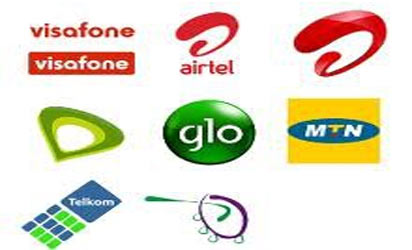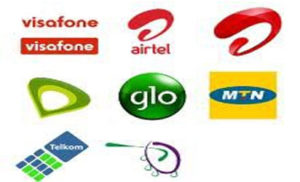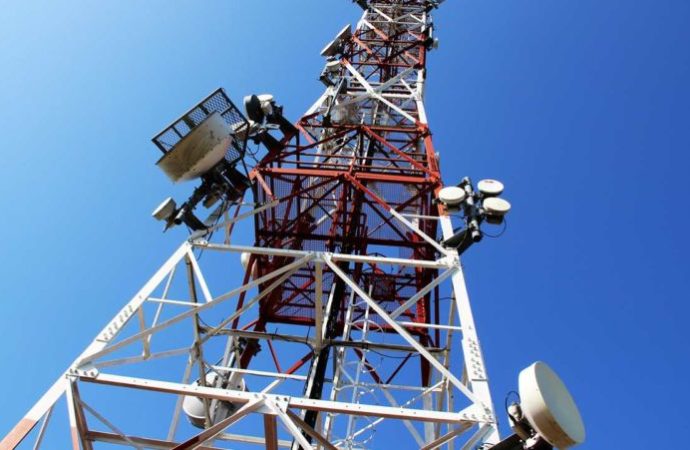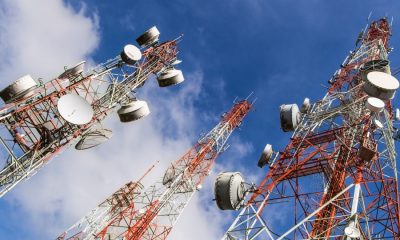Technology
NCC Begs CBN to Give Telcos Forex


By Dipo Olowookere
The Nigerian Communications Commission (NCC) has urged the Central Bank of Nigeria (CBN) to make forex available to telecommunications companies operating in the country.
Also, the agency said it is insisting on quality service from the firms.
The NCC said it is very worried by the degenerating Quality of Service (QoS) provided by Mobile Network Operators (MNOs) and other service providers in the country.
According to the Executive Vice Chairman of NCC, Prof. Umar Danbatta, the agency has written to the CBN Governor, Mr Godwin Emefiele, as part of measures to cushion the situation and ameliorate the recurrent inaccessibility to foreign exchange by operators.
Prof Danbatta said the CBN boss was favourably disposed to addressing the forex needs of the operators.
Specifically, he said, as a follow up to the letter, the Executive Commissioner (Stakeholders Management) of the NCC, Mr Sunday Dare, had a meeting with Mr Emefiele and extracted a commitment from him on how he hoped to address the forex needs of the operators.
Mr Danbatta, speaking in Abuja during an interactive session on Quality of Service delivery which NCC management had with operators, stated that since the NCC had declared 2017 as the year of the consumer, all hands should be on deck for telecom consumers to have a fresh lease to high Quality of Service.
“The consumer has to be treated with dignity,” Mr Danbatta noted, saying that the “8-point agenda drives this point home.”
The NCC, he explained, has put measures in place to check and monitor Quality of Service (QoS) on various networks “and we have sent this report to our task force on QoS and have been interacting with governments at different levels as part of the measures to deal with the poor QoS.”
Danbatta admonished the operators and co-location service operators to provide suggestions on how to address the situation. Earlier, NCC’s Executive Commissioner (Technical Services), Mr Ubale Maska said, QoS has been a great concern as consumers inundate the Commission with complaints.
“It requires everybody’s input if the situation has to be redressed, hence 2017 has been declared the year of the Consumer.”
NCC Director, Technical Standards and Network Integrity (DTSNI), Dr Fidelis Ona, explained that the Commission is aware of some of the challenges which include Right of Way (RoW), Force Majeure, Difficulty in acquiring new cell sites, multiple taxation and regulation, vandalism, power supply among others.
“We are engaging stakeholders, including Industry Working Group on Quality of Service, special committee on Counter Harmonization to address this.”
NCC’s Head, Quality of Service Unit, Engr. Edoyemi Ogoh in his presentation traced poor quality of service to fibre cuts, community issues, among others. He said in October 2016, operators experienced 175 cuts across the nation while they recorded 180 cuts in November and 103 in December, 2016.
There were 113 community issues in October 2016, 74 in November and 133 in December, adding that fibre cuts and community issues remain major drawbacks for QoS.
In their various presentations, some of the operators painted a grim picture of their encounters especially in an economy that is going broke.
Chief Technical Officer (CTO) at MTN Nigeria, Mr Hassan Jamil expressed happiness with the interactive session, so that the regulator can know our situation one on one basis…”
He said demand for both voice and data services are on the rise but we are unable to catch up on investment because of scarce forex availability.
The catalogue of woes he listed included inability to import equipment to boost expansion:
- We can’t transmit forex to vendors
- Incessant fibre cuts
- Community related challenges
- Scarcity of diesel to power base stations
- Right of Way issues with different layers of government in the regions
- Sabotage at different levels • We planned 100 sites for Abuja but after a very long-time we were only able to build six because of the bottlenecks of getting approvals and until we resolve these, quality of service will be a mirage.”
Similar situations were painted by representatives of Globacom Limited, Airtel Nigeria, Etisalat, American Towers Company (ATC), IHS Limited, among others.
The EVC encouraged the operators to be more creative by adopting alternative source of energy like solar power as a stop gap.
Technology
Emergent Ventures, Others Invest $2.2m in Potpie

By Dipo Olowookere
About $2.2 million pre-seed round to help engineering teams unify context across their entire stack and make AI agents genuinely useful in complex software environments has been announced by Potpie.
Potpie was established by Aditi Kothari and Dhiren Mathur, who were determined to unify context across the entire engineering stack and enabling spec driven development.
As generative AI adoption accelerates, most tools focus on surface-level code generation while ignoring the deeper problem of context.
Large language models are powerful, but without access to system-level understanding, tooling history, and architectural intent, they struggle in real production environments.
Traditional approaches rely on senior engineers to manually hold this context together, a model that breaks down at scale and fails when AI agents are introduced.
The platform enables teams to automate high-impact and non-trivial use cases across the software development lifecycle, like debugging cross-service failures, maintaining and writing end-to-end tests, blast radius detection and system design.
It is designed for enterprise companies with large and complex codebases, starting at around one million lines of code and scaling to hundreds of millions.
Rather than acting as another coding assistant, Potpie builds a graphical representation of software systems, infers behaviour and patterns across modules, and creates structured artefacts that allow agents to operate consistently and safely.
A statement made available to Business Post on Monday revealed that the funding support came from Emergent Ventures, All In Capital, DeVC and Point One Capital.
The capital will be used to support early enterprise deployments, expand the engineering team, and continue building Potpie’s core context and agent infrastructure, it was disclosed.
“As AI makes code generation easier, the real challenge shifts to reasoning across massive, interconnected systems. Potpie is our answer to that shift, an ontology-first layer that helps enterprises truly understand and manage their software,” Kothari was quoted as saying in the disclosure.
A Managing Partner at Emergent Ventures, Anupam Rastogi, said, “In large enterprises, the real challenge is not generating code, it is understanding the system deeply enough to change it safely.
“Potpie’s ontology-first architecture, combined with rigorous context curation and spec-driven development, creates a structured model of the entire engineering ecosystem. This allows AI agents to reason across services, dependencies, tickets, and production signals with the clarity of a senior engineer. That is what makes Potpie uniquely capable of solving complex RCA, impact analysis, and high-risk feature work even in codebases exceeding 50 million lines.”
Technology
Expert Reveals Top Cyber Threats Organisations Will Encounter in 2026

By Adedapo Adesanya
Organisations in 2026 face a cybersecurity landscape markedly different from previous years, driven by rapid artificial intelligence adoption, entrenched remote work models, and increasingly interconnected digital systems, with experts warning that these shifts have expanded attack surfaces faster than many security teams can effectively monitor.
According to the World Economic Forum’s Global Cybersecurity Outlook 2026, AI-related vulnerabilities now rank among the most urgent concerns, with 87 per cent of cybersecurity professionals worldwide highlighting them as a top risk.
In a note shared with Business Post, Mr Danny Mitchell, Cybersecurity Writer at Heimdal, said artificial intelligence presents a “category shift” in cyber risk.
“Attackers are manipulating the logic systems that increasingly run critical business processes,” he explained, noting that AI models controlling loan decisions or infrastructure have become high-value targets. Machine learning systems can be poisoned with corrupted training data or manipulated through adversarial inputs, often without immediate detection.
Mr Mitchell also warned that AI-powered phishing and fraud are growing more sophisticated. Deepfake technology and advanced language models now produce convincing emails, voice calls and videos that evade traditional detection.
“The sophistication of modern phishing means organisations can no longer rely solely on employee awareness training,” he said, urging multi-channel verification for sensitive transactions.
Supply chain vulnerabilities remain another major threat. Modern software ecosystems rely on numerous vendors and open-source components, each representing a potential entry point.
“Most organisations lack complete visibility into their software supply chain,” Mr Mitchell said, adding that attackers frequently exploit trusted vendors or update mechanisms to bypass perimeter defences.
Meanwhile, unpatched software vulnerabilities continue to expose organisations to risk, as attackers use automated tools to scan for weaknesses within hours of public disclosure. Legacy systems and critical infrastructure are especially difficult to secure.
Ransomware operations have also evolved, with criminals spending weeks inside networks before launching attacks.
“Modern ransomware operations function like businesses,” Mitchell observed, employing double extortion tactics to maximise pressure on victims.
Mr Mitchell concluded that the common thread across 2026 threats is complexity, noting that organisations need to abandon the idea that they can defend against everything equally, as this approach spreads resources too thin and leaves critical assets exposed.
“You cannot protect what you don’t know exists,” he said, urging organisations to prioritise visibility, map dependencies, and focus resources on the most critical assets.
Technology
NCC Begins Review of National Telecommunications Policy After 26 Years

By Adedapo Adesanya
In a consultation paper released to the public, the commission said it is seeking input from stakeholders, including telecom operators, tech companies, legal experts, and the general public, on proposed revisions designed to reposition Nigeria’s telecommunications framework to match current digital demands. Submissions are expected by March 20, 2026.
The NTP 2000 marked a turning point in Nigeria’s telecom landscape. It replaced the 1998 policy, introducing full liberalisation and a unified regulatory framework under the NCC, and paved the way for the licensing of GSM operators such as MTN, Econet (now Airtel), and Globacom in 2001 and 2002.
Prior to the NTP, the sector was dominated by Nigerian Telecommunications Limited (NITEL), a government-owned monopoly plagued by obsolete equipment, low teledensity, and poor service. At the time, Nigeria had fewer than 400,000 telephone lines for the entire country.
However, the NCC noted that just as the 1998 policy was overtaken by global developments, the 2000 framework has become structurally misaligned with today’s telecom reality, which encompasses broadband, 5G networks, satellite internet, artificial intelligence, and a thriving digital economy worth billions of dollars.
“The rapid pace of technological change and emerging digital services necessitate a comprehensive update to ensure the policy continues to support economic growth while protecting critical infrastructure,” the Commission stated.
The review will target multiple chapters of the policy. Key revisions include: Enhancements on online safety, content moderation, digital services regulation, and improved internet exchange protocols; a modern framework for satellite harmonisation, coexistence with terrestrial networks, and clearer spectrum allocation to boost service quality, and policies to address fiscal support, reduce multiple taxation, and lower operational costs for operators.
The NCC is also proposing entirely new sections to the policy to address emerging priorities. Among the key initiatives are clear broadband objectives aimed at achieving 70 per cent national broadband penetration, with a focus on extending connectivity beyond urban centres to reach rural communities.
The review also seeks to formally recognise telecom infrastructure, including fibre optic cables and network masts, as Critical National Infrastructure to prevent vandalism and enhance security.
In addition, the commission is targeting the harmonisation of Right-of-Way charges across federal, state, and local governments, alongside the introduction of a one-stop permitting process for telecom deployment, designed to reduce bureaucratic delays and lower operational costs for operators.
According to the NCC, the review aims to make fast and affordable internet widely accessible. “The old framework was largely voice-centric. Today, data is the currency of the digital economy,” the commission said, highlighting the need to close the urban-rural broadband divide.
The consultation process is intended to gather diverse perspectives to ensure the updated policy reflects current technological trends, market realities, and consumer needs. By doing so, the NCC hopes to maintain the telecommunications sector’s role as a key driver of economic growth and digital inclusion.
-

 Feature/OPED6 years ago
Feature/OPED6 years agoDavos was Different this year
-
Travel/Tourism10 years ago
Lagos Seals Western Lodge Hotel In Ikorodu
-

 Showbiz3 years ago
Showbiz3 years agoEstranged Lover Releases Videos of Empress Njamah Bathing
-

 Banking8 years ago
Banking8 years agoSort Codes of GTBank Branches in Nigeria
-

 Economy3 years ago
Economy3 years agoSubsidy Removal: CNG at N130 Per Litre Cheaper Than Petrol—IPMAN
-

 Banking3 years ago
Banking3 years agoSort Codes of UBA Branches in Nigeria
-

 Banking3 years ago
Banking3 years agoFirst Bank Announces Planned Downtime
-

 Sports3 years ago
Sports3 years agoHighest Paid Nigerian Footballer – How Much Do Nigerian Footballers Earn




















